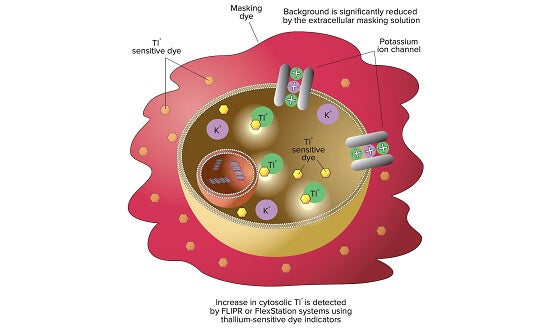
Ion Channels
What are ion channels?

High-throughput screening of ion channels in drug discovery
Mutations in ion channel genes can alter ion flow and disrupt the electrochemical balance. Abnormalities in ion channels have been associated with various disorders including epilepsy, ataxia, diabetes mellitus, cardiac arrhythmia, and cancer. That’s why ion channels have become increasingly important in drug discovery.
Ion channels are the second largest class of membrane proteins after GPCRs, with more than 400 protein families identified in the human genome.
Drug screening solutions can help us track drug-induced ion concentration changes and ion channel permeability. More importantly, monitoring ion channel activity is necessary for assessing drug cytotoxicity, as off-target drug effects on ion channels can lead to cardiac toxicity. In fact, a number of FDA-approved drugs had to be withdrawn for that reason.
Membrane Potential
Traditionally, patch clamping—considered the gold standard—has been the method of choice for measuring changes in membrane potential. Although it is the most informative, this method is very labor-intensive and time-consuming. It does not provide the solution for high-throughput drug screening of ion channels.
Molecular Devices developed the FLIPR® Membrane Potential Assay Kit to provide a fast, simple and reliable fluorescence assay for detecting changes in membrane potential. This assay provides a level of information approaching that of patch clamping. In combination with the FLIPR system, it provides a very good system for high-throughput screening of ion channel drug targets.
Potassium Channels
Potassium channels constitute the largest and most diverse group of ion channels, and they are expressed in virtually all cell types. Potassium channels are responsible for a variety of cellular functions including the maintenance and regulation of membrane potential, secretion of salt, hormone, and neurotransmitters. Not surprisingly, the dysfunction of potassium channels has been associated with many human diseases and off-target drug effects on potassium channels have been linked to cardiac toxicity.
The FLIPR® Potassium Assay Kit measures functional activity of ligand- and voltage-gated potassium channel activities on a FLIPR System. This reagent kit provides a homogeneous, fast, simple and reliable fluorescence based high-throughput assay for potassium channel activity.
Solutions for identifying early leads against ion channel targets
We offer a variety of assay and instrument solutions to support studies of ion channel function including assay kits, cellular screening and imaging systems, and microplate readers. Below we highlight key application notes for membrane potential and potassium channel assays: